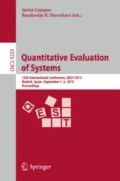Abstract
In traditional power distribution models, consumers acquire power from the central distribution unit, while “micro-grids” in a smart power grid can also trade power between themselves. In this paper, we investigate the problem of power trading coordination among such micro-grids. Each micro-grid has a surplus or a deficit quantity of power to transfer or to acquire, respectively. A coalitional game theory based algorithm is devised to form a set of coalitions. The coordination among micro-grids determines the amount of power to transfer over each transmission line in order to serve all micro-grids in demand by the supplier micro-grids and the central distribution unit with the purpose of minimizing the amount of dissipated power during generation and transfer. We propose two dynamic learning processes: one to form a coalition structure and one to provide the formed coalitions with the highest power saving. Numerical results show that dissipated power in the proposed cooperative smart grid is only \(10\,\%\) of that in traditional power distribution networks.
Access this chapter
Tax calculation will be finalised at checkout
Purchases are for personal use only
Notes
- 1.
This circuit is suitable for analysing its symmetrical three-phase operation.
References
Machowski, J., Bialek, J.W., Bumby, J.R.: Power System Dynamics: Stability and Control, 2nd edn. Wiley, New York (2008)
Coster, E.J.: Distribution Grid Operation Including Distributed Generation. Eindhoven University of Technology, The Netherlands (2010)
Ochoa, L., Harrison, G.: Minimizing energy losses: Optimal accommodation and smart operation of renewable distributed generation. IEEE Trans. Power Sys. 26(1), 198–205 (2011)
Tenti, P., Costabeber, A., Mattavelli, P., Trombetti, D.: Distribution loss minimization by token ring control of power electronic interfaces in residential microgrids. IEEE Trans. Ind. Electron 59(10), 3817–3826 (2012)
Saad, W., Han, Z., Poor, H.: Coalitional game theory for cooperative micro-grid distribution networks. In: IEEE International Conference on Communications Workshops (ICC), pp. 1–5, Kyoto, June 2011
Wei, C., Fadlullah, Z., Kato, N., Takeuchi, V.: GT-CFS: a game theoretic coalition formulation strategy for reducing power loss in micro grids. IEEE Trans. Parallel Distrib. Sys. 25(9), 2307–2317 (2014)
Osborne, M.J., Rubinstein, A.: A Course in Game Theory. MIT Press, Cambridge (1994)
Mohsenian-Rad, A.-H., Wong, V., Jatskevich, J., Schober, R., Leon-Garcia, A.: Autonomous demand-side management based on game-theoretic energy consumption scheduling for the future smart grid. IEEE Trans. Smart Grid 1(3), 320–331 (2010)
Vytelingum, P., Ramchurn, S., Voice, T., Rogers, A., Jennings, N.: Agent-based modeling of smart-grid market operations. In: IEEE Power and Energy Society General Meeting, pp. 1–8, Detroit, July 2011
Wang, Y., Saad, W., Han, Z., Poor, H., Basar, T.: A game-theoretic approach to energy trading in the smart grid. IEEE Trans. Smart Grid 5(3), 1439–1450 (2014)
Shams, F., Luise, M.: Basics of coalitional games with applications to communications and networking. EURASIP J. Wirel. Commun. Networks 1, 2013 (2013)
Saad, W., Han, Z., Poor, H., Basar, T.: Game-theoretic methods for the smart grid: an overview of microgrid systems, demand-side management, and smart grid communications. IEEE Signal Process. Mag. 29(5), 86–105 (2012)
Shapley, L.S.: A value for \(n\)-person games. contribution to the theory of games. Ann. Math. Stud. 2, 28 (1953)
Kakutani, S.: A generalization of Brouwer’s fixed point theorem. Duke Math. J. 8(3), 457–459 (1941)
Yahyasoltani, N.: Dynamic learning and resource management under uncertainties for smart grid and cognitive radio networks. Ph.D. dissertation, Department of Computer Engineering, University of Minnesota, USA (2014)
Galli, S., Scaglione, A., Wang, Z.: For the grid and through the grid: the role of power line communications in the smart grid. Proc. IEEE 99(6), 92–951 (2011)
Acknowledgement
This work is supported by the EU project QUANTICOL, 600708.
Author information
Authors and Affiliations
Corresponding author
Editor information
Editors and Affiliations
Rights and permissions
Copyright information
© 2015 Springer International Publishing Switzerland
About this paper
Cite this paper
Shams, F., Tribastone, M. (2015). Power Trading Coordination in Smart Grids Using Dynamic Learning and Coalitional Game Theory. In: Campos, J., Haverkort, B. (eds) Quantitative Evaluation of Systems. QEST 2015. Lecture Notes in Computer Science(), vol 9259. Springer, Cham. https://doi.org/10.1007/978-3-319-22264-6_4
Download citation
DOI: https://doi.org/10.1007/978-3-319-22264-6_4
Published:
Publisher Name: Springer, Cham
Print ISBN: 978-3-319-22263-9
Online ISBN: 978-3-319-22264-6
eBook Packages: Computer ScienceComputer Science (R0)

